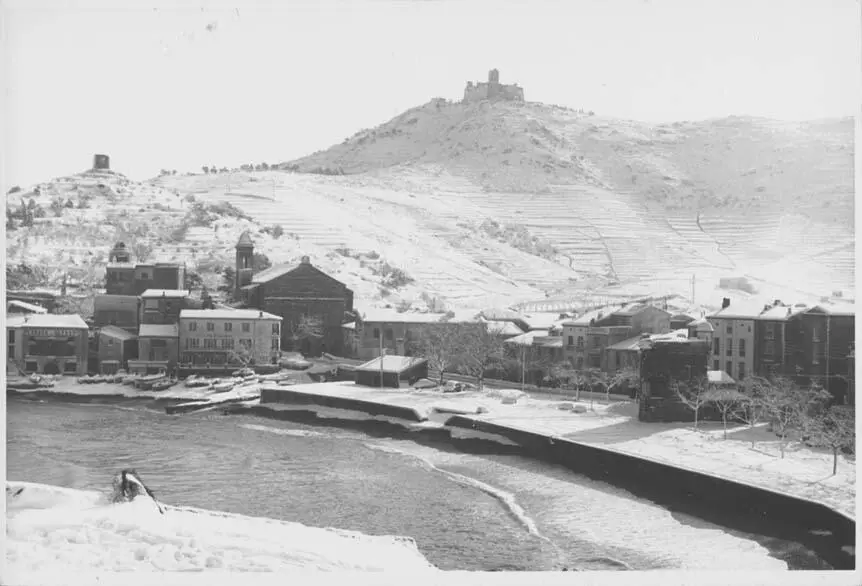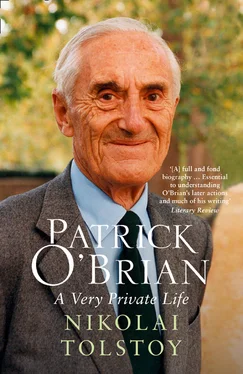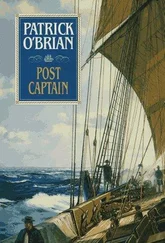This entry in my mother’s diary alludes to an outraged assault on late-night revellers in the restaurant on the ground floor. A year later, to her evident satisfaction, there was a repeat attack: ‘Last night someone threw a bottle outside the Puits: it made a fine noise.’ These incidents provoked inconclusive police and private investigations, all conducted at stentorian level on the spot, the fallout from which their friend Odette once told me had not entirely subsided half a century later.
As though this were not trial enough, Patrick understood barely a word of these vociferous exchanges, since almost everyone’s first or even sole language was Catalan. The occasional bilingual exchange was as often as not equally hard to understand. As my mother recorded:
The woman opposite went bankrupt, & left to live at Elne. There she took up with a man & they came back to live at her house here. His wife found out where they were, & on Sunday came & tried to get at them. They barred their door & she sat on a chair in the Street for six hours. A filthy scene (woman screeching French – man Catalan) by the arch 3 days ago must have been them, I think. The woman was dragging a 4–6 year old child with her.[fn5]
If the human cacophony momentarily waned in the early hours, it was only to be replaced by horrid war cries uttered by the martial cats of Collioure, who waged internecine conflict around gutters, doorways, and up and down stairs – there being generally no doors at street level to communal entrances. Even my parents’ tough little Welsh hunt terrier Buddug could barely hold her own against these feline hosts of Midian. She was enabled to sally forth at will through an entrance cut in the door to the flat. One fine spring day my mother reported: ‘Cats (toms) infest stairs, & Budd rages. She came in with v. bloody nose this morning.’ Their morals were as depraved as their conduct was aggressive. On 9 September 1951 my mother adopted a kitten from the rue , whom she named Pussit Tassit, entering her arrival at the appropriate date in her childhood Christopher Robin Birthday Book . The following May, Patrick ‘saw our cat being covered in the street by a large black tom while half a dozen others sat quietly watching’.
My mother’s diary entries regularly attest to the strain imposed by the unrelenting cacophony:
‘Our rue gets more & more noisy’; ‘Oh God I am so sick with hearing vicious slaps & more vicious screaming at Martine. Patrick tried to read a T.S.E[liot]. poem [ Burnt Norton ] aloud yesterday but was drowned by the noise in the rue. Both boiled this morning as cats howling kept us from sleeping’; ‘V. bad night: noises’; ‘Street noises formidable’; ‘Neither of us can sleep: too much noise.’
When their neighbour Madame Rimbaud fell ill and was visited by the doctor, his ministrations were accompanied by well-intentioned ‘Shoutings of choruses of women down there all day’.
Despite the disadvantages of their cramped quarters and noisy surroundings, my parents remained at first broadly satisfied with their new home, and swiftly became profound lovers of Collioure and its inhabitants. Their isolated and unproductive life in Snowdonia had long strained Patrick’s nerves to desperation, and there could be no doubting the truth of his parting aphorism: ‘it is better to be poor in a warm country.’[fn6]
In fact the weather at Collioure was far from being balmy throughout the entirety of the year. Winters could prove bitterly cold, and one snowstorm was so heavy that roofs collapsed beneath the weight. In January 1954 my mother recorded: ‘Snow thick from Al Ras to Massane; cold & it rained all night’, and shortly afterwards: ‘Rain in the night, & today the Dugommier hillside specked with snow. They say 15° [Fahrenheit] below zero at Font Romeu.’ I remember seeing in the town at that time photographs of what I recall as enormous waves frozen in mid-air as the sea hurled itself against the town walls. Life in the tiny flat above the rue Arago could be harsh indeed: ‘Ice on comportes in the rue; glacial wind. Mirus [stove] full blast hardly keeps us warm’; ‘Still 23° without, washing frozen into boards … Frightful cold: P. works au coin du feu.’
In spring the ‘maddening, howling tramontane’ battered the region for frustrating weeks, while in the autumn ‘Wind (from Spain) & clouds prevented plage. C’est le vent d’Espagne – il fait humide – c’est pas sain.’

Port d’Avall and Château St Elme under snow in 1954[fn7]
Of course much of the year was generally hot, but even then freak weather could strike Collioure’s microclimate, arising from its situation between the mountains and the sea. July 1953 saw a ‘fantastic hail storm … River vast red flow.’ Much of this belongs to the past, owing to climate change, but is important to recall when reliving my parents’ early days in Collioure.
A hostile critic has conjectured that Patrick’s move to Collioure was undertaken ‘perhaps, in order to be a long way from the family he had abandoned’.[3] In reality, seven years had passed since he finally left his first wife Elizabeth for my mother. Moreover, he continued in close touch with his young son Richard, the only other member of his immediate family, whom he had no intention of abandoning, while he maintained intermittent correspondence with his brothers, sisters and stepmother throughout the long years that lay ahead.
It is true that relations with his son had been troubled, although nothing approaching the extent alleged by subsequent critics. Richard O’Brian was, by his own admission, somewhat indolent as a child, and made unsatisfactory progress at the Devonshire preparatory school to which his father and my mother had sent him for two and a half years at great financial sacrifice to themselves. At the end of the summer term of 1947 Patrick was obliged to withdraw him, and set about teaching him at the house where he and my mother were living in North Wales. Although the boy’s education improved considerably in consequence, in some respects the experience was an unhappy one. Patrick’s own wretched childhood had left him constitutionally ill-equipped (for much of his adult life, at any rate) to deal with small children, a failing on occasion so pronounced as to be all but comical. Walking above Collioure in November 1951, he fled down a sidetrack on ‘seeing some beastly little boys’ – one of several similarly alarming encounters. He imposed what might now appear excessively rigorous discipline on his son during lessons. Although Richard regularly stayed with his mother in London during the ‘school holidays’, during his time in Wales he had missed her and his beloved boxer Sian acutely. Patrick and my mother were fond of dogs, but it was impossible to introduce Sian into the sheep-farming community of Cwm Croesor.
This regime continued for two years, during which time excruciating attacks of writer’s block made Patrick more and more testy and uncompromising in his efforts to educate the boy. It is likely that Patrick’s frustration with Richard’s lack of satisfactory progress was exacerbated by his own inability to achieve anything constructive in his writing. On the other hand, outside lessons he became in marked contrast a strikingly adventurous and imaginative parent. My mother’s unwavering affection, too, went far to ameliorate Richard’s life. Eventually, the ill-conceived scheme came to an end, with the departure of Patrick and my mother for Collioure in September 1949. That July Richard’s mother Elizabeth married her longstanding lover John Le Mee-Power, which enabled her to make a successful application to the courts to recover custody of her son.
Читать дальше













